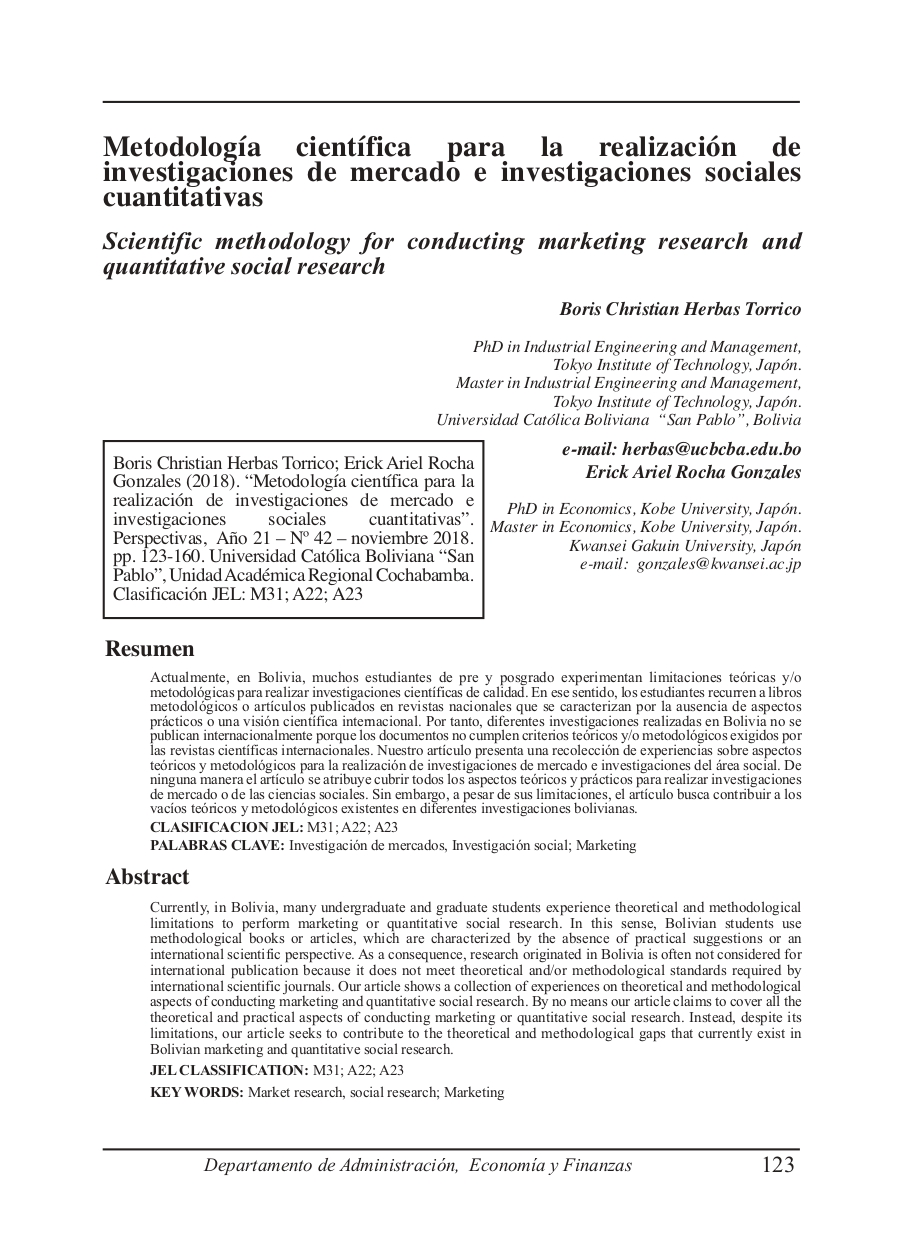Scientific methodology for conducting marketing research and quantitative social research
DOI:
https://doi.org/10.35319/3vr4a870Keywords:
Market research, Social research, MarketingAbstract
Currently, in Bolivia, many undergraduate and graduate students experience theoretical and methodological limitations to perform marketing or quantitative social research. In this sense, Bolivian students use methodological books or articles, which are characterized by the absence of practical suggestions or an international scientific perspective. As a consequence, research originated in Bolivia is often not considered for international publication because it does not meet theoretical and/or methodological standards required by international scientific journals. Our article shows a collection of experiences on theoretical and methodological aspects of conducting marketing and quantitative social research. By no means our article claims to cover all the theoretical and practical aspects of conducting marketing or quantitative social research. Instead, despite its limitations, our article seeks to contribute to the theoretical and methodological gaps that currently exist in Bolivian marketing and quantitative social research.
Downloads
References
Aslam, S., & Emmanuel, P. (2010). Formulating a researchable question: A critical step for facilitating good clinical research. Indian Journal of Sexually Transmitted Diseases and AIDS, 31(1), 47.
Bartlett, J. E., Kotrlik, J. W., & Higgins, C. C. (2001). Organizational research: Determining appropriate sample size in survey research. Information Technology, Learning, and Performance Journal, 19(1), 43–50.
Cochran, W. (1977). Sampling techniques (3rd ed.). Wiley.
Frost, J. (2017). Five regression analysis tips to avoid common problems. Retrieved November 27, 2017, from http://statisticsbyjim.com/regression/regression-analysis-tips/
Grinell, R., & Unrau, Y. (2010). Social work research and evaluation: Foundations of evidence-based practice (9th ed.). New York: Oxford University Press.
Hair, J. F., Black, W. C., Babin, B. J., & Anderson, R. E. (2010). Multivariate data analysis. Learning (7th ed.). Englewood Cliffs NJ: Prentice-Hall.
Hayes, B. E. (2008). Measuring customer satisfaction and loyalty: Survey design, use, and statistical analysis methods. Milwaukee, WI: American Society for Quality.
Hulley, S., Cummings, S., Browner, W., Grady, D., & Newman, T. (2007). Designing clinical research (3rd ed.). Philadelphia, USA: Lippincott Williams and Wilkins.
Hyman, L., Lamb, J., & Bulmer, M. (2006). The use of pre-existing survey questions: Implications for data quality. European Conference on Quality in Survey Statistics, 3.
Janiszewski, C., Labroo, A. A., & Rucker, D. D. (2016). A Tutorial in consumer research: Knowledge creation and knowledge appreciation in deductive-conceptual consumer research. Journal of Consumer Research, 43(2), 200–209.
Jonker, J., & Pennink, B. (2010). The essence of research methodology: A concise guide for master and PhD students in management science. London: Springer International Publishing.
Krejcie, R., & Morgan, D. (1970). Determining sample size for research activities. Educational and Psychological Measurement, 30(3), 607–610.
Kothari, C. (2004). Research methodology: methods and techniques (2nd ed.). New Delhi, India: New Age International Publishers.
Kumar, R. (2014). Research Methodology: A step-by-step guide for beginners. New Age International (3rd ed.). London: Sage.
Malhotra, N. K., & Birks, D. F. (2006). Marketing research: An applied approach (2nd ed.). Essex, England: Pearson Education Inc.
Marczyk, G. R., DeMatteo, D., & Festinger, D. (2005). Essentials of research design and methodology. New Jersey, USA: John Wiley & Sons Inc.
McGrath, J. E. (1981). Dilemmatics. American Behavioral Scientist, 25(2), 179–210.
Novikov, A. M., & Novikov, D. A. (2013). Research methodology: From philosophy of science to research design. London: Taylor & Francis Group.
Rowley, J., & Stack, F. (2004). Conducting a Literature Review. Management Research News, 27(6), 31–39.
Sapsford, R., & Jupp, V. (2006). Data collection and analysis (2nd ed.). London: Sage Publications.
Schwartz, B. (2004). The paradox of choice: Why more is less. New York: Ecco.
Webster, J., & Watson, R. (2002). Analyzing the past to prepare for the future: Writing a literature review. MIS Quarterly, 26(2).
Wood, M. J., & Ross-Kerr, J. C. (2006). Basic Steps in Planning Nursing Research (7th ed.). London: Jones and Bartlett Publishers.

Downloads
Published
Issue
Section
License
Copyright (c) 2018 Revista Perspectivas

This work is licensed under a Creative Commons Attribution-NonCommercial-ShareAlike 4.0 International License.
La Revista Perspectivas de la Universidad Católica Boliviana, es una revista de acceso abierto, por lo tanto, es de libre acceso en su integridad. Está permitida su lectura, búsqueda, descarga, distribución y reutilización legal en cualquier tipo de soporte únicamente para fines no comerciales, siempre y cuando la obra sea debidamente citada.




